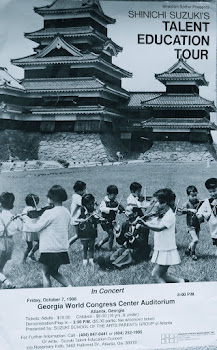"To Dr. Kataoka "Kansei" (translated as sensibility) is the sum of the five senses, plus the intangible heart and soul, through which children absorb their environment."(1)
When we remember holidays past as adults, it may be the aroma of certain foods or the scent of the Christmas tree that remind us of our feeling/experiences as children. It could be the Christmas lights or the sound of carols, or that certain kind of hug from someone we love. Ultimately it is the "intangible heart and soul" that remembers the "feelings" of the holidays.
Babies and children learn through absorption of the total environment, rather than part by part. In holistic learning, the child has a grasp of a concept without necessarily knowing the details or even being able to produce anything. It is this type of learning that enables a person to perceive what is going on without necessarily being able to actually say in words what is happening. In learning language, babies are holistically absorbing the environment, and understand long before they are able to articulate. Children in general know feelings even when they do not know exactly what is being said.
In a practical situation a holistic learner using their sensibility would be able to cope with problem solving issues, while another student going by the textbook answers may be unable to solve. This is how a person can be in a completely foreign country where they do not speak the language, yet be able to communicate and act appropriately without ever learning the customs or being told the protocol. Contrast this with how a person can grow up to be completely unaware of how other people are thinking, feeling or perceiving, or unable to make good judgments even though they have gone to the best schools and have a lot of "education". We see this in real life and wonder how to educate children to make wise judgments in the complexities of day to day reality.
How can we preserve and nurture sensibility? Essentially, by having awareness of the child's senses and giving credence to them. Dr. Suzuki said:
"Skillfulness in rearing a child comes from knowing and feeling as he (the child) does in his heart."(2)So this means taking the time and the presence to experience life directly with our children. This includes listening and not thinking of other things when your child is talking and giving the space for the child to enjoy the moment without rushing to the next thing, In this way the child has the time to discover without extra instruction or thinking. Find the place of a calm peaceful happy heart inside yourself and notice how your child responds to you. As Dr. Suzuki said:
"The mother's smile is the child's smile."(3)In music study, the child who learns holistically can play freely without the burden of too much thinking or worrying in the way. Music then becomes a form of direct communication. There are two important things you can do over the holidays to nurture your child's music study:
1. Continue to play the Suzuki recordings. Providing music in the environment is enabling holistic learning. In this way even if the child practices less, they will not forget their pieces, and will be internally memorizing the new pieces to be learned in the coming months. Additionally this provides a consistent environment and motivates them to go to the piano and play their review pieces.
2. Let your child share their music with friends and family. When children can give their music as a gift to others in family and friend gatherings, they will develop a wonderful feeling and "memory" about sharing their piano playing. Also, you can use the video recordings as gifts to send to relatives and friends far away with a personal holiday message. This kind of sharing is a wonderful example of a holistic learning experience as it integrates feelings, senses, and ability.
Thanksgiving is the beginning of the Holiday season. It's wonderful to begin the season with the feelings of gratefulness and abundance.
Happy Holidays!
Bibliography
1. Sensibility and Education, Dr. Haruko Kataoka, p. xii
2. Ability Development from Age Zero, Dr. Suzuki, p. 23
3. Words for the Day, #2-A collection of 31 sayings by Dr. Suzuki written on shikishi. (See right side of the blog for picture)
*Edited and reposted from 12_20_2010





